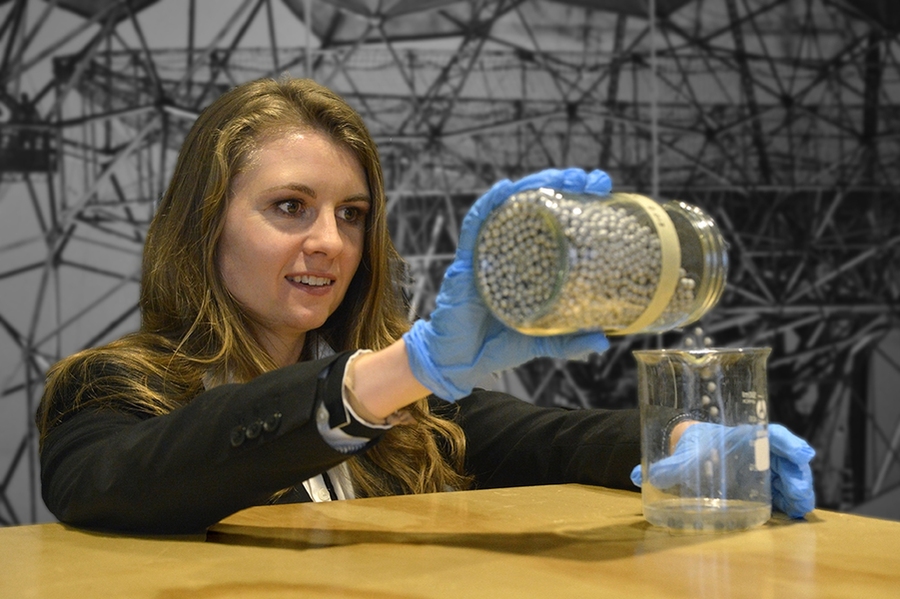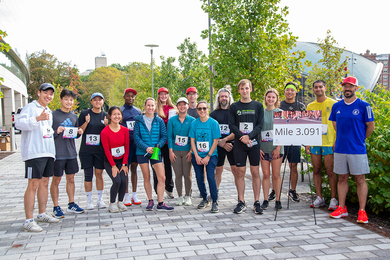"I came into MIT with a music background and learned over the first few years I was there how to be an engineer, how to think like an engineer," Jean Sack, a member of the technical staff in MIT Lincoln Laboratory's Energy Systems Group, explained to a CNN reporter. CNN featured Sack on "The Next List" in 2013 for her innovation as a mechanical engineering undergraduate working at the Beaver Works Center in Cambridge, Massachusetts. She had headed a 28-student team tasked with developing an underwater power system as part of a Beaver Works capstone project. During her graduate studies, Sack went on to volunteer as a teaching assistant in a follow-on capstone course offered by the MIT Department of Mechanical Engineering (MechE). Exemplifying the Beaver Works philosophy that student engagement in collaborative, real-world-inspired projects fosters innovation, Sack has continued to build upon her milestone experience since joining the MIT Lincoln Laboratory last July.
Sack's interest in renewable energy extends as far back as her unique upbringing in northern California. "Our house was powered entirely by photovoltaic cells with rain water collection for drinking water," she says of the house that her parents built in which to raise her and her brother. Now, renewable energy provides a means to help bring about global change. "I see climate change as the most critical issue facing the world, and as our methods for energy production of all types have put us here, our only hope is to phase out carbon-emitting power as soon as possible."
A collaborative capstone project at Beaver Works allowed Sack to pursue her passion for alternative energy, while growing her perspective as an engineer. Professor Douglas Hart of MechE taught the class that Sack managed, and he described it as being run like a startup company: the professor acts as a technical advisor, allowing the students to take control of the project at hand. Sack considered the capstone projects to be the most rewarding technical courses offered at MIT because the students were able to apply the knowledge they had learned in other courses to advance current technology.
"I started working with Beaver Works the spring term of my junior year at the encouragement of some of my teammates from the rowing team," says Sack, who enjoyed the opportunities for creative problem solving that the course offered. After that semester, Hart asked if Sack would be willing to serve as the student CEO for the next term. "Working with Professor Hart taught me how to stand up for myself and present competently, and dramatically increased my self-confidence and willingness to jump into a project when I had no idea where it would go," she says.
Nicholas Pulsone, senior staff in the Advanced Undersea Systems and Technology Group, along with several other laboratory staff, had been collaborating with Hart for two years on the project in which Sack's team played an important role. The team was tasked with developing a new power system for the REMUS 600 that would extend this unmanned underwater vehicle's range to the point where it could be used to access any port in the world from U.S. military bases. Using MIT student Jonathan Slocum's innovative aluminum fuel, the team designed a system that would utilize the reactivity of aluminum with water, effectively eliminating the need for a million-dollar a day research ship.
Now working at the laboratory for over half a year, Sack has become involved in a wide array of projects. "In her short time in the Energy Systems Group, Jean has contributed across a number of programs, including those in undersea power systems and soldier power applications," says Scott Van Broekhoven, leader of this group. "Jean has also helped to mentor the existing year's students in the development of a power source to extend soldier endurance." This current capstone project, which focuses on developing novel energy technologies to alleviate the logistics burden on the U.S. Marine Corps, has provided a platform for Sack to guide MIT students using her experience from her own capstone.
"Whenever I hear Jean describe her work as a student, project CEO, and teaching assistant in a Beaver Works capstone course, it brings a smile to my face," says Robert Shin, head of the Intelligence, Surveillance, and Recfonnaissance and Tactical Systems Division and director of Beaver Works, who personally recommended Sack for her current position after seeing her performance at Beaver Works. "Beaver Works provides transformational experiences for many MIT students, and you only have to talk to Jean to understand how project-based learning changes a student's perspective on engineering. And, of course, I am thrilled to have Jean working at the laboratory, and I hope Beaver Works helps us discover many more such talented, engaged future staff members."








